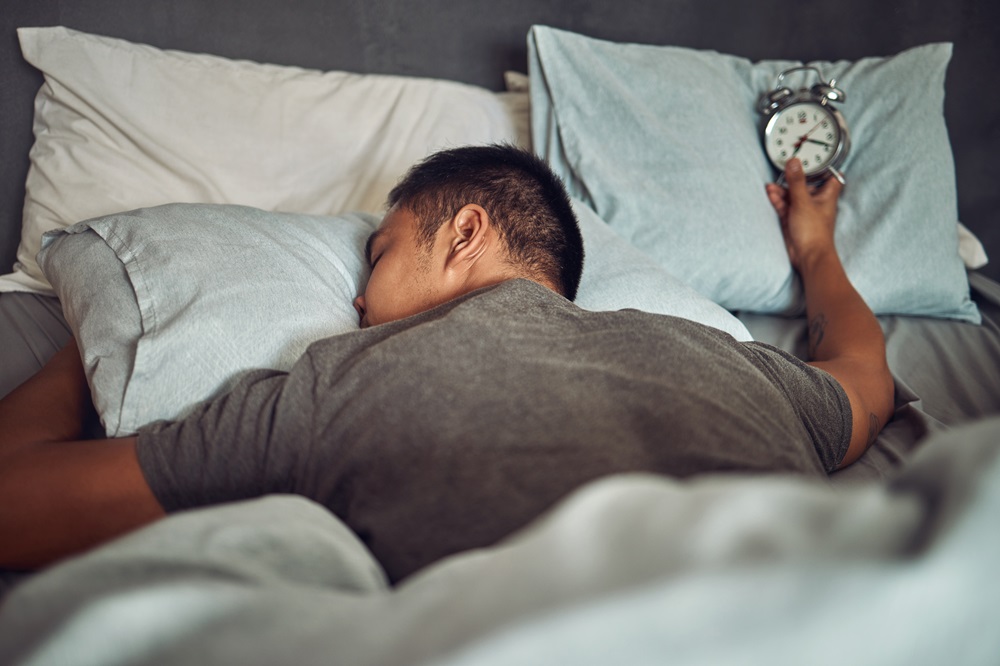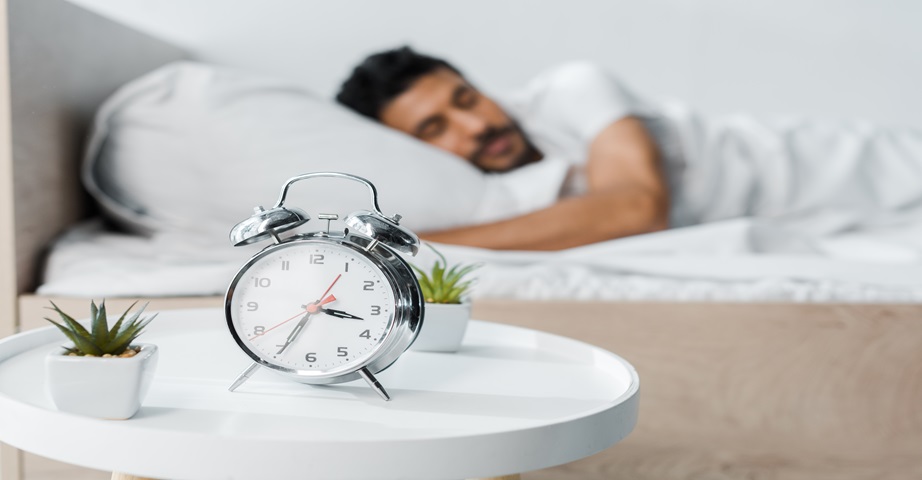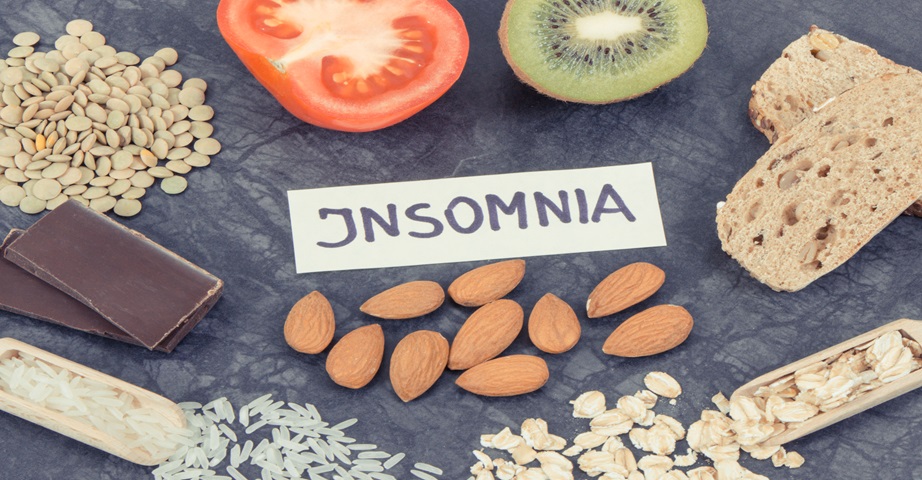Sleep hygiene - how to take care of a good sleep?

Sleep is a natural physiological state of the organism that occupies a significant part of human life, allowing the regeneration of the body, as well as affecting human health and well-being. Increasingly society complains of difficulty falling asleep and insomnia, and poor sleep quality can have serious consequences and contribute to the dysfunction of the whole body. What is good for sleep? What is sleep hygiene, and what are the principles of healthy sleep?
What is sleep hygiene?
Sleep hygiene is a way to get good sleep - a set of recommendations and behaviours that can provide good quality sleep, and thus positively affect human health and well-being. The rules of the sleep hygiene are tips, the use of which can facilitate falling asleep and support the regeneration of the body. These are guidelines that may be particularly helpful among people who suffer from insomnia or problems with falling asleep, but as part of prevention they can be used by every person.
What is sleep and what are the phases of sleep?
However, before you learn the rules of the sleep hygiene, it is worth taking a moment to explore the issue of night rest. What is sleep, and what are the phases of sleep?
The sleep is a physiological activity and a natural biological need of the body that allows the regeneration of the organism. It is a functional state of the central nervous system, which appears and passes cyclically during the circadian rhythm. During sleep, there is a decrease in sensitivity to external stimuli, and what is more, physiological functions and motor activities are slowed down.
The sleep is a complex phenomenon in which two main phases can be distinguished, namely:
- NREM phase, or slow-wave, deep sleep - during its duration, eye movements slow down, theta and delta waves appear in the brain, and the body goes into a state of deep rest;
- REM phase, the stage of sleep during which the brain remains more energized than in the NREM phase. Then can be observed rapid eye movements and dreams. The REM phase promotes the regeneration of the body and the repair of microdamages, and also allows mastering new skills that have been acquired during the day.
The NREM and the REM phases follow each other cyclically, and during the night they can repeat several times.
Healthy sleep - the importance of sleep for the human body
Healthy sleep is the basis for the regeneration of the body and is extremely important for the proper functioning of the human body. The good quality sleep has a positive effect on metabolism, as well as on the work of the immune system. In addition, it supports the functioning of the circulatory system, the work of the endocrine and digestive systems, as well as promotes the proper functioning of the nervous system and has a positive effect on mental health and well-being. Deficit of the sleep and its lack can cause a disorder of the system, and in the long term, insufficient sleep can have a number of serious consequences, including increasing the risk of developing diseases. What is insomnia, and what can be the causes and consequences of the sleep deprivation?

Sleep disorders - what is insomnia?
In order to function properly, you need to rest long enough and effectively. However, scientific research indicates that sleep disorders may affect about 20% of the population, and this number is still growing. One of the problems associated with night rest and regeneration of the body is insomnia, which can be defined as a disorder of the proper rhythm, depth and duration of sleep.
People who suffer from the insomnia struggle not only with the difficulties of falling asleep, but also maintaining sleep and waking up during the night. Their sleep is shallow and poor quality, which forbid regeneration, rest and return to full strength. We can distinguish episodic insomnia, which is short-term, which lasts from a few to several days, as well as chronic insomnia, which occurs for a longer period of time. What are the causes of sleep disorders and what are the causes of the insomnia?
What are the causes of sleep problems?
The sleep is extremely important for the proper functioning of the body, and still remains underestimated. The fast pace of life means that we lack time for night rest, and excessive stress, which we are exposed to every day, promotes insomnia and sleep problems. The most common cause of disorders of night regeneration of the body is improper sleep hygiene, including excessive exposure to blue light - using the phone right before bedtime or watching television, as well as high temperature in the bedroom, noise or light. In addition, sleep problems can be caused by, previously mentioned, excessive stress, as well as shift work or stimulants. The causes of the insomnia also include frequent naps during the day or irregular lifestyle, as well as rheumatic diseases, hyperthyroidism, sleep apnoea, depression and disorders of the circulatory and respiratory system.
Consequences of sleep deprivation
The sleep deficiency can negatively affect the body, contributing to mood disorders, memory and concentration problems, as well as reducing the ability to regenerate body cells. Insufficient amount and poor quality of the sleep can also result in prolonged reaction time, distraction, decreased efficiency and fatigue, and deterioration of physical performance. Long-term sleep deprivation may contribute to the weakening of the immune system, an increased risk of infection and to an increase in blood pressure. In addition, it can cause impaired secretion of steroid hormones and slow metabolism, while increasing appetite, which can result in uncontrolled weight gain and increase the risk of developing obesity and metabolic syndrome. Lack of the sleep can also result in increased levels of thyroid hormones and pro-inflammatory cytokines, and increased levels of CRP, a marker of inflammation. So, how to improve the quality of sleep? What about a good dream?

How to improve the quality of sleep? - The rules of sleep hygiene
Focusing on the principles of the sleep hygiene and introducing some modifications to your daily habits and behaviours is one of the easiest ways to improve your sleep quality. Taking care of a healthy sleep can have a positive effect on the well-being, as well as the physical and mental condition of the human body, improving both daily productivity and the overall quality of life. The proper sleep hygiene rely on paying attention to behaviours and habits that can affect night recovery. What are the ways to improve the quality of sleep?
- Take care of a regular lifestyle - set fixed hours of sleep and getting up
- In the evening, reduce the emission of blue light
- Take care of a comfortable place and the right conditions for sleeping
- Pay attention to the daily menu
- Avoid drugs in the evening
- Calm down and relax before bed
- Include physical activity in your daily plan
The human body likes repetition, regularity and patterns, so try to get up and go to bed at the same time every day, which will help regulate the circadian rhythm and can make that falling asleep will become much easier. Constant habits can also reduce the feeling of daytime sleepiness, and what's more, they can have a positive effect on energy levels, as well as the desire to act and perform daily duties and activities.
Phones, laptops or televisions are equipment that accompany us constantly during the day. They make it possible to find the necessary data, the desired information, and at the same time emit blue light, which stimulates the brain to work. During the day, moderate use of electronics should not have serious consequences, but in the evening, when the body needs to calm down before bedtime, exposure to blue light and excess stimuli is not a good solution, as it can contribute to the disruption of melatonin secretion, also known as the sleep hormone, and can also stimulate the body and make it difficult to fall asleep.
If you have the opportunity, allocate one room in the flat exclusively for a night rest. Let the bedroom be used only for sleeping, and not also for watching television or working at the computer. In addition, when arranging a room for regeneration, choose a comfortable bed with a properly fitted mattress, as well as good quality pillows and a duvet and bedding with a pleasant texture that will make your time in bed more pleasant. In addition, pay attention to the optimal conditions in the bedroom - maintain the ideal temperature of the room, which is 17 -21 degrees Celsius, ventilate the room half an hour before going to bed and also give up artificial light during the night - it is best for sleep and melatonin secretion to be affected by darkness, undistracted by the light of the night lamp.
Scientific data suggests that certain foods may promote the sleep and improve the sleep quality. How is that possible? Some components of the daily diet contain tryptophan, an exogenous amino acid that can participate in the synthesis of melatonin, and thus can have a positive effect on the sleep. The sources of the tryptophan include walnuts, pumpkin seeds, sunflower seeds, egg yolk, tuna or chicken breast meat, therefore, it may be a good solution to include these products in the daily menu. In addition, it is worth noting that the diet used is diverse and varied, rich in macro-and micronutrients, the appropriate supply of which ensures the proper functioning of the body and promotes falling asleep and good sleep quality.
Dinner should be easy to digest and balanced. It should contain vegetables and a source of complete protein, complex carbohydrates and healthy fats. A good idea for the last meal of the day can be, for example, whole-grain sandwiches with tuna paste and peppers or vegetable salad with grilled chicken breast with the addition of sunflower seeds.
In the evening, it is worth giving up fatty and stodgy dishes, such as fried meat, highly processed ready-made dishes or fast-food, which burden the digestive system. It is also not worth binging on sweets at night, which, causing insulin release, can have a stimulating effect.

Stimulants such as alcohol or cigarettes at any time of the day do not have a positive effect on the body, but especially in the evening it is worth giving up products of this type. A good solution may also be to give up coffee or strong tea just before going to bed.
Caffeine, as a natural stimulant, can stimulate the body and thus make it difficult to fall asleep and negatively affect the quality of sleep. On the other hand, alcohol can negatively affect the quality of night regeneration, making it difficult to enter the NREM phase during sleep. In turn, nicotine, which can stimulate the body, can also disturb the cycles and phases of sleep, precluding full regeneration of the body. The stimulants just before bedtime can also cause sleep disorders, insomnia and nightmares.
Relaxation is one of the most effective ways to improve the quality of sleep. Calming thoughts and the moment of calming the body are treatments that can reduce the level of stress in the body, increase melatonin secretion, improve well-being, relax and soothe, preparing the body for night rest. Relaxation techniques that are worth using before bedtime include yoga, meditation, music therapy or massage.
As you probably know, regularly practicing physical activity can have a beneficial effect on the work of the whole body. How can exercise affect sleep? Exercise can reduce feelings of anxiety and stress, and regular workouts can improve sleep quality and make it easier to fall asleep.
Exercise should be planned in the morning or noon - physical activity accelerates blood circulation and raises body temperature, while stimulating the body, making it difficult to fall asleep. Therefore, intensive training is better to give up 2-3 hours before bedtime.
How to take care of a healthy sleep? - Dietary supplements for better sleep
On the market can be found many different preparations and dietary supplements, whose task is to support the body in the process of falling asleep and a positive effect on the quality of sleep. A significant part of the available products recommended among people who are struggling with sleep disorders contain natural ingredients such as melatonin, a hormone secreted by the pineal gland, which, among others, can extend the duration of sleep, and also magnesium or vitamin B6, which are ingredients that can have a restful and calming effect on the body. Night regeneration may also be supported by preparations containing gamma-aminobutyric acid (GABA), which can improve the quality of sleep, as well as dietary supplements rich in glycine or ashwagandha, or substances, which can have a positive effect on the nervous system. Among the products supporting good sleep, can be also found herbal tablets that contain hops, valerian or melissa.
Choosing a dietary supplement that can improve the quality of sleep is an individual matter. However, firstly it is worth paying attention to the sleep hygiene and introducing some modifications in everyday life, and only then reach for dietary supplements, which can help calm the body and make it easier to fall asleep.

